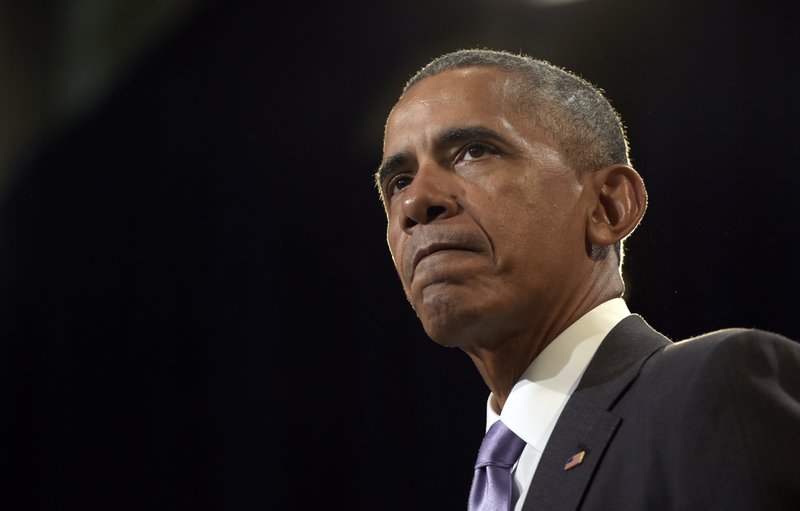MIAMI -- President Barack Obama on Thursday defended his health care program, long a target of Republicans and recently criticized by some Democrats, saying millions of Americans "now know the financial security of health insurance" because of the Patient Protection and Affordable Care Act.
"It's worked," he said, even while allowing that the program isn't perfect. "No law is."
Less than two weeks before the Nov. 1 start of the enrollment period for Affordable Care Act health plans, Obama flew to a south Florida college to kick off a push by the administration to encourage more people to sign up, with a particular emphasis on young adults.
Obama is trying to burnish his legacy as the president who, after decades of failed attempts by Washington, finally brought health care to millions. But what he attempted Thursday was a difficult sales job, as the 2010 law faces new and troubling challenges.
Premiums are rising by double digits in many parts of the country, and some major insurers have quit the program, leaving consumers with fewer choices next year and contributing to higher prices that are plaguing the program.
The troubles have bolstered the arguments of Republicans and added some top Democratic allies to the crowd of critics.
Former President Bill Clinton, while campaigning in support of Hillary Clinton's presidential bid, called the Affordable Care Act "the craziest thing in the world." Minnesota Gov. Mark Dayton, a Democrat, said it is "no longer affordable."
In his remarks, Obama chalked up GOP criticism of the law to "nothing more than politics" and envy that "a Democratic president named Barack Obama passed the law. That's just the truth."
He called on both parties to set aside the "political rhetoric" and "be honest about what's working, what needs fixing and how we fix it." He urged the new president and the next Congress to "take what we've learned over the past six years ... and make the ACA better."
House Speaker Paul Ryan, R-Wis., wasn't buying the president's pitch.
"At this point, one thing is clear. This law can't be fixed," Ryan said, calling for the law to be replaced with "patient-centered reforms" that would give people more choice and control over their health care needs.
Congressional Republicans have failed to repeal the law, despite numerous attempts. Obama said doing so would just make things worse. "Right off the bat repeal would take away health care from 20 million people," plus cancel other protections that benefit millions.
Health and Human Services Secretary Sylvia Burwell said this week that she expects 13.8 million people will sign up for 2017 coverage, a modest increase over the 12.7 million consumers who picked health insurance plans during open enrollment for this year.
Obama presented his own prescription to make the law better, including getting Florida and more than a dozen states that haven't yet done so to accept federal funding to expand Medicaid and bring health insurance to millions more people.
He also called for providing tax credits to help middle-class Americans and young adults afford coverage, creating a "public plan fallback" to provide more options, particularly for people in rural and other hard to reach areas, and encouraging state innovation.
Obama compared problems in the law to a bug in new technology. He said, for example, that a company will fix a problem with a smartphone.
"They upgrade it, unless it catches fire and then they just pull it off the market," Obama joked, in a reference to the recalled Samsung Galaxy Note 7 smartphone. "But you don't go back to using a rotary phone. You don't say, we're repealing smartphones."
Insurers say most of those who signed up for coverage since the law took effect turned out to be sicker than expected, which is costing them money. Young adults, who generally are in better health, make up a disproportionate share of the people who remain uninsured, the White House said. The administration says it will work aggressively to encourage more of them to sign up to help stabilize the program. Sign-ups end Jan. 31, 2017.
Taxpayer subsidies are provided to help cover premiums for plans purchased through state marketplaces. The subsidies are designed to increase as premiums increase to help soften the blow to people's wallets. About 85 percent of customers get this kind of financial help.
Still, millions of people buy individual policies outside of the health care law's marketplaces and many will be hit with the full premium increases.
Under the law, more than 21 million previously uninsured people are now covered. The law also provides new protections, including allowing children to stay on their parents' plans through age 26 and providing cost-free preventive care.
While in the Miami area, Obama headlined a campaign rally for Democratic presidential candidate Hillary Clinton. He also addressed a fundraiser for Democratic governors that was closed to the news media.
A Section on 10/21/2016

